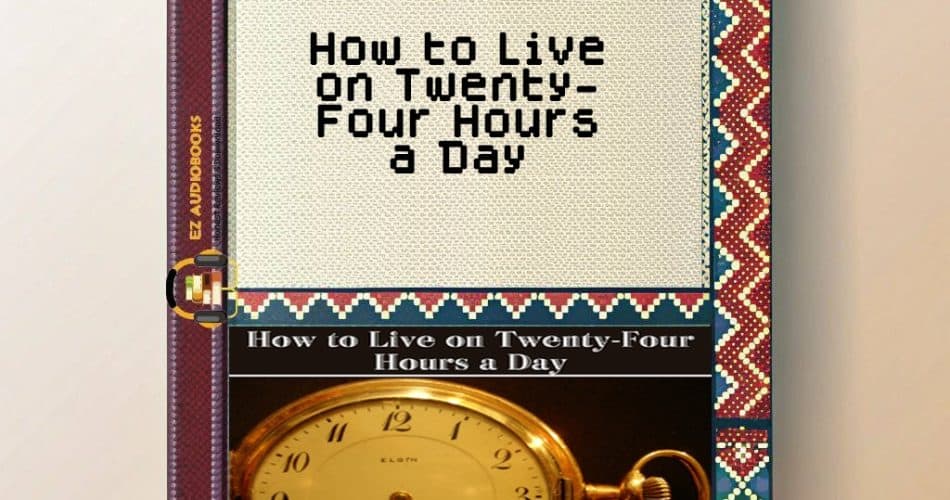Audiobook Sample
Listen to the sample to experience the story.
Please wait while we verify your browser...
- Title: How to Live on Twenty-Four Hours a Day
- Author: Arnold Bennett
- Narrator: Mark F. Smith
- Length: 01:36:54
- Version: Abridged
- Release Date: 01/01/2017
- Publisher: LibriVox
- Genre: Self Development, Health & Wellness
- ISBN13: SABLIB9788288
Here’s what makes this interesting: Arnold Bennett’s “How to Live on Twenty-Four Hours a Day”, narrated by Mark F. Smith, isn’t just a self-help audiobook – it’s a time capsule of early 20th-century hustle culture that still vibes with our over-scheduled, digitally-drenched lives in 2025. I stumbled across this gem while prepping for a ‘Future of Stories’ podcast episode, and let me tell you, it’s like finding a hidden Easter egg in the self-development genre. Originally penned in 1908 as a series of London Evening News articles, this little book was aimed at white-collar workers trapped in the monotony of their daily grind – sound familiar? Bennett’s mission? To shake us out of autopilot and show us how to “actually live” within the 24 hours we’re all handed daily. And with Mark F. Smith’s narration, this free audiobook experience becomes a surprisingly intimate wake-up call.
Let’s break this down: I’ve always been fascinated by how storytelling mediums shape our connection to ideas. A few years back, when I compared five versions of “Project Hail Mary” for my podcast – physical book, ebook, audiobook, audio drama, and BookTok takes – the audiobook’s sound design blew me away with its alien language immersion. Similarly, with Bennett’s work, I found myself reflecting on my own chaotic days as a digital culture critic. Between recording podcasts, writing for The Atlantic, and keeping up with my 800K BookTok followers, I’m no stranger to the ‘rat race’ Bennett describes. Listening to him carve the day into an 8-hour work chunk and a 16-hour personal playground hit me hard. I started testing his 90-minute self-improvement chunk – swapping late-night scrolling for poetry or philosophy – and suddenly, my days felt less like a treadmill and more like a canvas.
The book’s core is all about time as the ultimate equalizer. Bennett’s got this gleeful, almost cheeky tone when he reminds us that saints and slackers alike get the same 24 hours – no VIP passes, no shortcuts. He pushes you to ditch the ‘exceeding your programme’ mindset (his fancy way of saying ‘overdoing it’) and invest in mental pursuits – reading great literature, reflecting on cause and effect, chasing what sparks joy. It’s practical yet philosophical, like a friend who’s equal parts life coach and poet. The cultural impact here is wild too – Henry Ford loved it so much he handed it out to his employees, and today, it’s popping up in digital decluttering chats online. In a world where my phone pings me 50 times an hour, Bennett’s call to intentional living feels like a rebellion against the algorithm.
Now, let’s talk Mark F. Smith’s narration, because the listening experience hinges on it. His voice is warm, steady, and unpretentious – think of a wise uncle who’s seen it all but still gets excited about life’s little hacks. He nails Bennett’s blend of wit and earnestness, making lines like ‘Which of us “lives” on twenty-four hours a day?’ land with just the right punch. The audio quality, courtesy of LibriVox’s public domain magic, is clean and crisp – no fancy sound effects, just pure vocal delivery. At just over 97 minutes, it’s short enough to binge in one commute or savor across a few mornings. I listened while sipping coffee in my Cambridge apartment, and Smith’s pacing turned Bennett’s advice into a gentle nudge rather than a lecture.
That said, it’s not flawless. The book’s early 20th-century roots show – Bennett assumes you’ve got a predictable 9-to-5, which doesn’t quite match the gig-economy chaos or remote-work blur many of us navigate. And while Smith’s narration is solid, it’s straightforward – don’t expect the dynamic flair of a multi-voice drama. If you’re used to modern self-help audiobooks with high-energy narrators or immersive soundscapes, this might feel a tad understated. Still, its simplicity is part of its charm, like a minimalist playlist in a world of overstuffed Spotify queues.
How does it stack up? Think of it as a great-grandparent to books like Greg McKeown’s “Essentialism”. Both wrestle with time and purpose, but Bennett’s got a literary flair McKeown trades for sleek pragmatism. Where “Essentialism” feels like a TED Talk, “How to Live” is a fireside chat – less polish, more soul. It’s also got a mindfulness streak that echoes today’s wellness trends, minus the jargon. I’d recommend it to anyone who’s ever felt stuck – whether you’re a BookTokker hunting for your next obsession, a podcast junkie, or just someone who wants to reclaim their hours. The fact that it’s a free audiobook download via LibriVox or Audiobooks.com? That’s the cherry on top.
Reflecting on this, I keep circling back to my BookTok days breaking down “The Seven Husbands of Evelyn Hugo”. The community there went wild over how the narrator’s voice unlocked character depth they’d missed in print. With Bennett, it’s less about character and more about “you” – Smith’s delivery makes you feel like the protagonist of your own time-management saga. It’s not just an audiobook experience; it’s a mirror. I’ve started sketching out a follow-up TikTok series on vintage self-help – imagine the comments when I pair this with a Gen Z twist on ‘exceeding your programme.’ Time’s a democracy, sure, but Bennett and Smith make it feel like a revolution worth joining.
Until our next dive into the digital deep end, Sophie
Sophie Bennett

